The ILO in collaboration with UN Indonesia conducted a media visit to one of the ILO’s Better Work Indonesia’s garment factories in Semarang. The media visit provided insights and real experiences to Indonesian journalists about working lives in the garment sector.
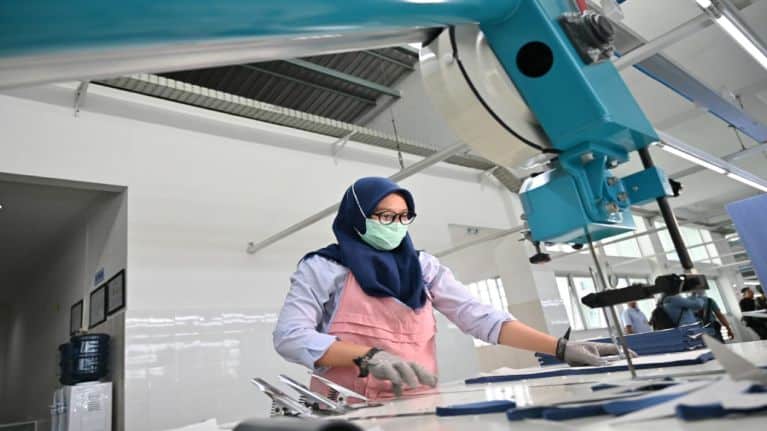
A group of eight selected journalists representing Indonesia’s leading print, electronic and online media participated at the media visit programme to one of the garment factories in Semarang, jointly conducted by the UN Indonesia and the ILO. The media visit was conducted to showcase an example from one of the ILO’s Better Work Indonesia’s (BWI) partnership with a manufactory enterprise in Ungaran, Semarang.
“This is closely linked with the efforts to reach the goals of the Sustainable Development Goals (SDGs), particularly the Goal 8 on Decent Work and Economic Growth and other relevant goals.”
Anita Nirody, UN Resident Coordinator for Indonesia
Conducted at PT Ungaran Sari Garments (PT USG), the media visit provided an opportunity for mass media organizations to have a better understanding and knowledge about working conditions and situation at the garment factory as Indonesia is known as the one of the world’s leading exporters of textiles, garments and apparel production. To date, the Indonesian apparel industry has provided a million jobs and is worth almost 8 billion USD of exports annually.
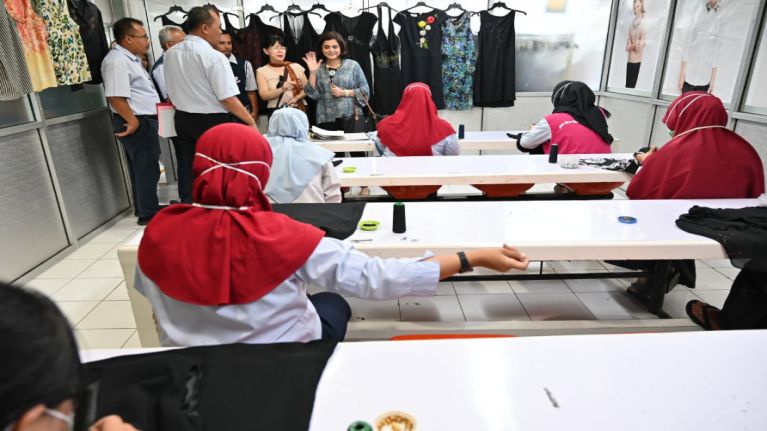
Established in 1975, PT USG started with only one factory and 200 employees. Forty two years later, the company has 13 factories in three locations, employs around 15 thousands workers of whom 95 percent are women and produces 33.6 million pieces per year. Joining the ILO’s BWI programme in 2013, PT USG has been recognized as the first high-performance factory in 2018.
“This is my first visit and it is incredible to witness the good work that has been done in the field. SECO has a close partnership with Indonesia since 2009 and better jobs is one of the goals for both Indonesia and us.”
Remy Duvien from the Swiss State Secretariat for Economic Affairs (SECO)
Anita Nirody, UN Resident Coordinator for Indonesia, congratulated the achievements made by PT USG. She also appreciated the multiplying impacts given by the company to not only its workers and their families but also to its surroundings and to the economy of the nation.
“This is closely linked with the efforts to reach the goals of the Sustainable Development Goals (SDGs), particularly the Goal 8 on Decent Work and Economic Growth and other relevant goals,” she stated, adding her appreciation to donors supporting the labour compliance through the partnership between ILO’s BWI with Indonesia’s garment factories.
“As the majority of garment workers are female. It is important to have their voices and ideas heard and implemented. It is also important for mass media to learn best practices implemented at the company level to be widely disseminated.”
Michiko Miyamoto, Country Director of the ILO for Indonesia
Remy Duvien from the Swiss State Secretariat for Economic Affairs (SECO), as one of the donors of the ILO’s Better Work Indonesia, appreciated the partnership built between the ILO’s BWI Programme and the garment industry. “This is my first visit and it is incredible to witness the good work that has been done in the field. SECO has a close partnership with Indonesia since 2009 and better jobs is one of the goals for both Indonesia and us,” he said.
Meanwhile Michiko Miyamoto, Country Director of the ILO for Indonesia, emphasized the importance of win-win solution through bipartite dialogue at the company level as demonstrated by PT USG. “As the majority of garment workers are female. It is important to have their voices and ideas heard and implemented. It is also important for mass media to learn best practices implemented at the company level to be widely disseminated,” she stated.
Promoting transparency bipartite dialogue
The UN, ILO and mass media delegations visited the three factory plants of PT USG. When visiting the first production plant, the delegations were welcomed with a daily exercise in between work as part of the ethical production practices. “To ensure the welfare of our workers, we conduct two daily exercises in the morning and afternoon so that the workers can take a break from their work routines and to maintain their work fitness,” told Nur Arifin, Senior Manager for Human Resources and Compliance of PT USG.
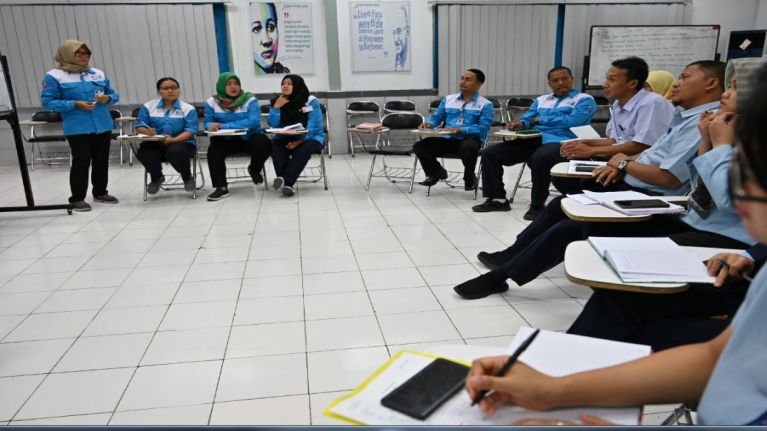
In the second production plant, Arif (he used to be called) took the delegations to visit the newest eco-factory building equipped with new technology tools and machines. Lines up of workers were skilfully using the machines throughout the overall process of the production from cutting, sewing, assembling, quality control and packaging.
“I am impressed with the transparency shown by PT USG. This mechanism should be applied at all workplaces. Trusts are surely built between workers and the management that, in turn, create a comfortable working environment.”
Azis Kumala, a journalist from the Indonesian News Agency (Antara)
“We have also invented our own prototype to help our workers working faster,” Arif showed a simple machine helping the worker neatly stacking the collar part of the garment.
He then took the delegations to observe a grievance mechanism meeting between the management and the staff union. In one of the meeting rooms, representatives of management and staff union sitting down together, discussing issues raised by both parties. Issues raised were varied from workers’ facilities, training needs to common facilities (parking areas, cafeteria and so forth). All of the issues raised and responses given were transparently disseminated through the information board.
“I am impressed with the transparency shown by PT USG. This mechanism should be applied at all workplaces. Trusts are surely built between workers and the management that, in turn, create a comfortable working environment,” said Azis Kumala, a journalist from the Indonesian News Agency (Antara).
Women’s empowerment programme
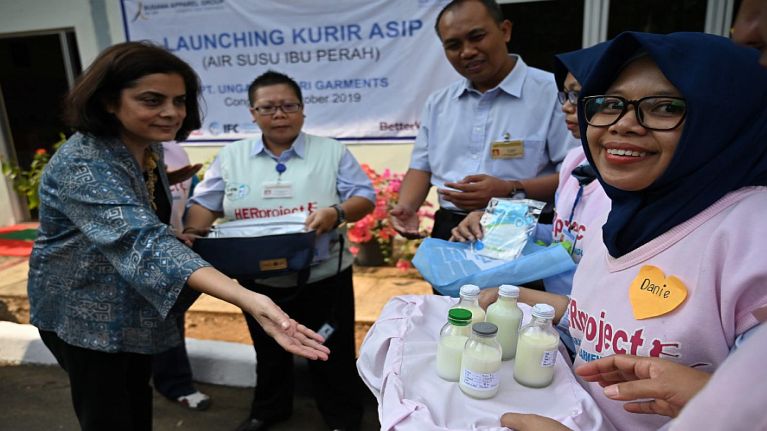
The final visit was conducted to see the company’s women empowerment programme which was initiated in 2014. The programmes consist of maternity programme, lactation programme, health educational programme and post-maternity programme. To effectively assist the women workers, the company has appointed peer educators to further promote a healthy lifestyle.
The visit also marked the launch of the PT USG’s latest initiative: a courier of breast milk service. The service was given by the company to ensure the implementation of the lactation programme. “We desire to fully support our female workers. When we improve their health and their families, we found that their productivity is increased and that is beneficial for business,” stated Arif.
“We desire to fully support our female workers. When we improve their health and their families, we found that their productivity is increased and that is beneficial for business.”
Nur Arifin, Senior Manager for Human Resources and Compliance of PT USG
He continued that the new initiative was inspired by difficulties faced by employees who just come back to work after their maternity leave in offering exclusive breastfeeding to their infants. “I do not think all the efforts taken as burdens to the company. It is an investment to create better working conditions for all of us,” he concluded.
“If all companies are able to replicate what have been done by the PT USG, women workers should never feel afraid of being replaced by other workers or their job being terminated because of pregnancy and maternity.”
M. Julian, a journalist from Kontan, a business daily
“If all companies are able to replicate what have been done by the PT USG, women workers should never feel afraid of being replaced by other workers or their job being terminated because of pregnancy and maternity,” said M. Julian, a journalist from Kontan, a business daily.
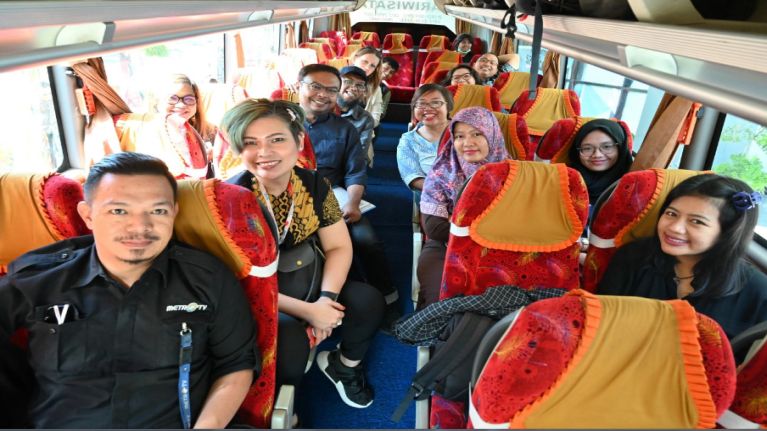
PT USG is one of the factories supported by the ILO’s BWI programme. To date, BWI programme has reached 216 factories with almost 400,000 workers of whom 80 percent are women in Jakarta, West Java and Central Java. BWI is a partnership between the ILO and the International Finance Corporation (IFC), aimed to improve compliance with labour standards and promote competitiveness in global supply chains.